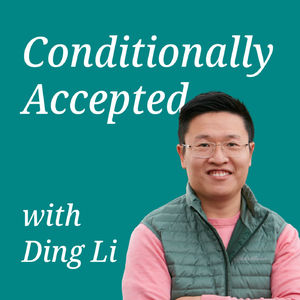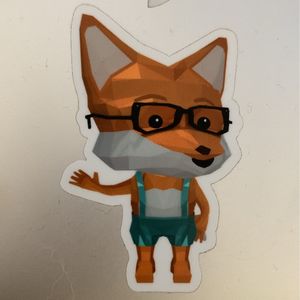

 11. Building a Research Lab and Putting Students' Interests First (Toby Li, University of Notre Dame)
11. Building a Research Lab and Putting Students' Interests First (Toby Li, University of Notre Dame)Hello and Welcome to Conditionally Accepted! I'm Ding Li, an AI and HCI researcher, and Conditionaly Accepted is my show about research, work, and life at the intersection of humans and technology. Today, I have the pleasure of speaking with Toby Li, an assistant professor at the University of Notre Dame. Toby's research focuses on designing practical, human-centered AI systems for those really complex, knowledge-intensive tasks we face every day. He recently became the director of the Human-Centered Responsible AI Lab at the Lucey Family Institute for Data Science and Society. In this episode, we explore Toby's journey as a new faculty member and how he's building his research group from the ground up. Toby shares his unique approach to fostering a thriving lab culture, emphasizing the importance of open communication, trust, and always putting his students' interests first. We also get into some really interesting discussions about the potential pitfalls of algorithmic management at Amazon warehouses, the realities of academic salaries, and his vision for the future of responsible AI. Toby's candid insights make this a truly captivating conversation. So without further ado, let's dive right in! 💬 💬 💬 💬 💬 Reach out to me: * 📧 Email: ding@halfmaker.com * 📱 Signal/WhatsApp: (+1) 206-745-2849 * 💡🎙️Let me know your feedback and suggest future topics and guests! 🎧🎧🎧🎧🎧 Listen Now: * 🍎 Apple Podcast: https://podcasts.apple.com/us/podcast/conditionally-accepted-with-ding-li/id1649122789 * 🎵 Spotify: https://open.spotify.com/show/0TJvQWAJQLVmS1FA1Z0qYO * 🌐 All Other Platforms: https://lidingzeyu.com/show/subscribe 🤝🤝🤝🤝🤝 Connect with Me: * 🐦 Twitter/X: https://x.com/dingzeyuli * 🧵 Threads: https://www.threads.net/@dingzeyuli * 💼 LinkedIn: https://www.linkedin.com/in/dingzeyuli * 🎥 YouTube: https://www.youtube.com/@conditionallyaccepted Chapters: * 0:00 Introduction and Welcome * 0:50 Starting a Research Lab During the Pandemic * 2:56 Building Lab Culture * 6:57 PhD Mentorship Philosophy * 10:45 Defining Success in Academia * 17:40 Interdisciplinary Collaboration and Community Building * 28:15 Fostering Lab Community and Casual Connections * 43:56 Human-Centered Responsible AI * 58:00 Balancing Opportunities and Growth
 10. Tips on wrapping up your PhD and survive the job hunt
10. Tips on wrapping up your PhD and survive the job huntIn this episode, we discuss strategies for wrapping up your PhD dissertation and preparing for life after grad school. I am your Host, Ding Li. and today we have Henrique and David share their experiences around finalizing PhD theses. We talk about focusing on the minimum viable product rather than perfectionism. A done thesis is better than a perfect thesis. Later in the show, we dive into the PhD job hunt - when to start applying, how many jobs to apply to, and skills like communication that are crucial for interviews. We also discussed the importance of talking to people who recently graduated to get insider perspectives on companies and positions. Stick around as we reflect on the stress of the PhD job search and how to evaluate different job offers. Whether you're still developing your thesis or already interviewing for your next steps after graduating, we hope this episode provides some guidance and reassurance during this transitional period. Leave a comment in the youtube video or email me at podcast@halfmaker.com Youtube Channel https://www.youtube.com/channel/UCRZzkxDroA3qS6EpTJy014w
 9. LLMs and Robotics | How can academia engage in expensive LLM research?
9. LLMs and Robotics | How can academia engage in expensive LLM research?Large language models and GPT are trending these days. In this episode, Henrique and I sit down with David watkins from Boston Dynamic AI institute. We talk about how LLM is transforming robotics research. We dive into the cutting-edge research happening around generative models and foundation models like GPT, and how these powerful AI systems can be applied to robotics to enable new capabilities. David provides unique insights into the challenges and opportunities of training robots to function more intelligently in dynamic real-world environments. Since we all work closely with academia, we also discussed on why top universities are currently absent from the LLM race. It seems like the rich universities do have a ton of endowment funds at a comparable level as the top tech firms, what are the reasons they are not engaging on LLM trainings? If you haven't subscribed already please like and subscribe now. Rich universities have comparable endownment fund as tech firms: tweet Leave a comment in the youtube video or email me at podcast@halfmaker.com
 8. PhD Survival Guide: Top Lessons I Wish I Knew Earlier
8. PhD Survival Guide: Top Lessons I Wish I Knew EarlierIf you are still working towards your PhD degree, this episode is for you! In this week's episode, we dive deep into the challenges and opportunities facing early PhD students. From navigating idea generation to building key connections, Henrique and Rohan share their personal stories and advice for surviving and thriving as a beginner in academia. We discussed the messy behind-the-scenes struggles most students face but rarely discuss out loud. We talked about the importance of invest in yourself and be patient. How to deal with peer pressure and sometime self-pressure. I wished I could hear discussions like this when I started my PhD journey and I hope you find it helpful too. * 0:00 - Intro * 1:13 - Rohan: The challenge of early PhD years - Being patient with yourself * 6:25 - Henrique: How to deal peer pressure and/or self-imposed pressure * 21:30 - When to build vs when to buy * 27:40 - Celebrating small wins and taking all the help you can early on * 34:10 - Ding's two stories on asking questions and reaching out to people * 40:01 - How to keep oneself motivated. * 44:49 - Pair up with peers in your field * 49:03 - The Ira Glass quote on creativity and taste * 51:00 - Project timelines across subfields Leave a comment in the youtube video or email me at ding@dingzeyu.li
 7. Will you take a fully in-person job? Let's talk about hybrid and remote work!
7. Will you take a fully in-person job? Let's talk about hybrid and remote work!Since 2020, many people at different tech companies have switched to a hybrid and remote work style, myself included and the same for many friends. Although this is already more or less true even before covid, now I feel like it's the default and I can't see a future where 100% in-person work makes sense for a lot of the software jobs out there. In this episode, Henrique and I chatted about how we feel about this change, and how we are adapting to it. We also touched on some related topics like how to decide which meetings to attend, and how to do mentorship over zoom. We also talked about the speaker coach feature in MS Teams, which is a really cool feature that I didn't know about before. * 0:00 Listener feedback from last episode on fatigue. * 5:12 How does it feel to work in a distributed team? * 9:01 How do you decide which meetings to attend? * 24:41 Will you take a fully in-person job in the future? * 32:47 Mentorship over zoom (and its challenges). * 36:47 Speaker Coach feature in MS Teams. Leave a comment in the youtube video or email me at ding@dingzeyu.li
 6. Physical and Mental Fatigue at Work | Social Exhaustion
6. Physical and Mental Fatigue at Work | Social Exhaustion* 0:00 intro and work fatigue * 6:05 work life balance & setting boundaries * 15:54 when to ask question? * 23:30 using chat bot at work * 32:47 meeting versus building Leave a comment in the youtube video or email me at ding@dingzeyu.li
 5. Different roles for Researcher in Small/Medium/Large Companies
5. Different roles for Researcher in Small/Medium/Large CompaniesA listener emailed me asking what to expect when switching from big tech to be a research lead at a smaller company. This inspires me to record this episode to share my thoughts on different roles researchers will take on in small/medium/large companies. * 0:00 question from listener * 1:57 in small company (no product yet) * 5:08 in medium company (1-2 products) * 7:01 in large company (a family of products) * 9:30 switching from big tech to startup 📤 Leave a comment in the youtube video or email me at ding@halfmaker.com
 4. What makes a good research internship? Spoiler: it's more than just a paper.
4. What makes a good research internship? Spoiler: it's more than just a paper.What makes a good research internship? * 0:00 Intro * 1:16 Two types of goals * 2:23 Type 1: Measurable outcomes: patents, papers, tech transfers * 5:17 Type 2: Hard to measure outcome: do I want to work here? * 10:06 Conclusion Leave a comment in the youtube video or email me at ding@halfmaker.com
 3. Why become a professor in UK? Is UK more chill? (with Zahra Montazeri)
3. Why become a professor in UK? Is UK more chill? (with Zahra Montazeri)Zahra and I talked about her recent move from SF to Manchester UK and becoming a professor. She also shared about her experience leaving Disney Research and her thoughts around industry versus academia. Zahra Montazeri: LinkedIn Homepage
 2. Layoff, Hiring Freeze, and what we can do (with Cat Chen)
2. Layoff, Hiring Freeze, and what we can do (with Cat Chen)Cat and I discuss about the layoff trend in the current recession. And more importantly, what can we all do when many companies have hiring freezes and layoffs.
 1. Publish paper or build product? (with Henrique Maia)
1. Publish paper or build product? (with Henrique Maia)Henrique and I chat about how I view publishing academic papers versus producitzing cutting edge research. Research engineers and research scientists are both popular job titles that PhD graduates chase after. What's their difference and similarity?
 4
4 1
1